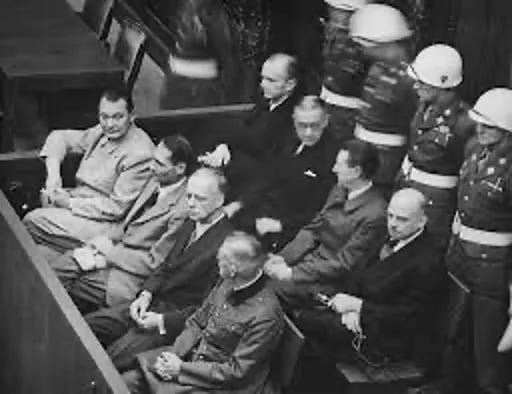By Dr. Isaiah (Ike) Wilson III, Colonel, U.S. Army (Retired)
The American military’s tradition of subordination to civilian authority is often spoken of in hallowed terms—an ironclad principle that has allowed democracy to survive and thrive. It is the foundation upon which military professionalism rests, enshrined in the oath taken by every soldier: to “well and faithfully discharge” all lawful orders.
This obligation is sacrosanct and should be so; an unyielding commitment to the chain of command, even when those orders lead to outcomes that are ethically fraught or politically disastrous.
But what happens when obedience to lawful orders crosses into complicity in moral atrocity? What happens when a legally valid directive turns into an act the world will later judge as a crime against humanity?
This is not an abstract question. It is a real and present conundrum in American civil-military relations—one that has been conveniently ignored in peacetime, rationalized away in wartime, and exposed, again and again, only in the aftermath of historical tragedies.
As the United States enters an era of democratic fragility, with authoritarian impulses gripping its highest offices, it is no longer enough to simply assert that “the military obeys lawful orders.” We must confront the reality that legality and morality are not synonymous, and that the day may come when the U.S. military is asked to carry out actions that—while technically legal—will be judged by history as unforgivable.
The Doctrine of Subordination: The Right of Civilian Leaders to Be Wrong
At the heart of American civil-military relations is a paradox. The military must be completely subordinated to civilian authority, even when that authority is flawed, reckless, or outright wrong. The U.S. system does not grant military leaders veto power over civilian decisions, nor does it allow them to refuse orders based on personal moral objections.
This doctrine has survived war and peace, crisis, and stability. It has endured through moments of great consequence, from General MacArthur’s dismissal by President Truman over Korea to the Pentagon’s reluctant execution of the Vietnam War under Lyndon B. Johnson and Richard Nixon. The military serves the state, not the other way around.
Yet, this unwavering obedience presents an unsettling truth: military personnel are bound to follow orders even when they foresee disaster. The Iraq War was launched on dubious intelligence, yet the military executed it. The war in Afghanistan dragged on for two decades, despite deep skepticism among commanders, yet they continued to fight it. The obligation to obey supersedes the prerogative to dissent.
And yet, the military does not swear an oath to a president, nor to a policy. It swears an oath to the Constitution—to protect and defend it against “all enemies, foreign and domestic.”
What happens, then, when the greatest threat to the Constitution is the civilian authority issuing the orders?
The “Day After” Conundrum: What If the Military Gets It Wrong?
Imagine a future scenario—one that no longer feels implausible.
A duly elected American president, having declared a national emergency, suspends the upcoming election, citing widespread fraud (despite no evidence). Protests erupt. The president invokes the Insurrection Act, ordering the military to suppress demonstrations. Mass arrests follow. The military, obeying lawful orders, detains thousands of American citizens. Opposition figures are prosecuted in military courts. By the time the courts intervene, democracy is no longer recognizable.
At every stage, the orders were legal. No explicit coup occurred. The military, acting within the bounds of its duty, obeyed.
And yet, in the aftermath, it is judged by history as complicit.
This is the nightmare scenario—the one we dismiss as paranoia until it is too late. And it raises the question: how does the military avoid becoming the enforcer of tyranny under the guise of legality?
From Nuremberg to Abu Ghraib: The Limits of “We Were Just Following Orders”
History provides ample precedent for military obedience leading to moral catastrophe. The Nuremberg Trials rejected “just following orders” as a defense for Nazi officials who carried out genocide under legally sanctioned directives. The trials established a new legal norm: individuals are responsible for their actions, regardless of the legality of the orders they receive.
The U.S. military itself has confronted this dilemma before—most notably in My Lai, Vietnam, where American soldiers massacred civilians under direct orders from their superior officers. The soldiers later argued that they were simply obeying commands. The world did not accept this rationale.
More recently, in the post-9/11 era, the Pentagon found itself in legal and ethical gray zones—from torture at Abu Ghraib to indefinite detention at Guantanamo Bay. While senior officials provided legal justifications, the soldiers who carried out these actions were left bearing the consequences. The stain of those decisions lingers.
These cases should serve as a warning: lawfulness does not absolve moral responsibility.
A New Doctrine of Obedience and Resistance
The American military has long prided itself on professionalism and discipline. But in an age of rising authoritarianism, those qualities alone will not be enough.
A new framework is needed—one that does not challenge the military’s subordination to civilian leadership but clarifies its obligations when confronted with legal yet morally reprehensible orders. This framework should include:
A Revitalized Ethical Code: Military officers must be trained to recognize when lawful orders conflict with the fundamental principles of the Constitution. Ethics training should move beyond theoretical discussions and include historical case studies where obedience led to moral failure.
A Legal Challenge Mechanism: Senior military leaders should have a formal process to question orders that, while legal, may lead to unconstitutional or inhumane outcomes. This should not be an act of defiance, but a structured method of seeking civilian legal review before execution.
A Doctrine of Lawful Resistance: While outright refusal to obey legal orders is untenable, military personnel must have a defined pathway to challenge directives that risk placing them on the wrong side of history, or worse, … their own humanness. This doctrine should establish a clear distinction between political defiance and constitutional defense.
Congressional Oversight as a Backstop: The military should engage Congress as a check against executive overreach. The Pentagon’s obligation is not to the sitting president alone but to the structure of government itself. Congressional reporting on extraordinary orders should be mandatory.
Avoiding the Next Nuremberg
The world has seen this story before. Military institutions have obeyed lawful orders, only to face moral and legal reckoning when the dust settles.
The American military must confront this reality before it becomes history. Because one day, in a courtroom, a soldier may be asked why they carried out an order that led to atrocities. The world will not accept “we were just following orders.”
If the military waits until the “Day After” to reckon with this dilemma, it will already be too late.
Would love to hear thoughts from those within and beyond the defense community. How should the military navigate this conundrum before it becomes a crisis?
Let’s discuss. #CivilMilitaryRelations #Ethics #USConstitution #MilitaryLeadership




